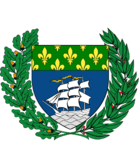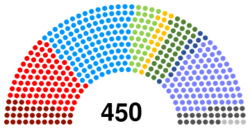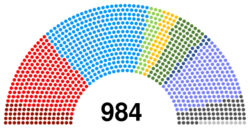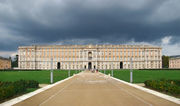Calican Parliament
Calican Parliament
| |
|---|---|
|
22nd Calican Parliament of the Calican Republic | |
 | |
| Type | |
| Type | Bicameral |
| Houses |
Senate Chamber of Deputies |
| Leadership | |
| Prime Minister | Célia Garreau, PL |
| President of the Senate |
Estelle Rodin Since 12 April 2624 |
| President of the Chamber of Deputies |
Emiliano Curci Since 12 April 2624 |
| President of the Calican Republic | Louis Alfonse Gaglione, LD |
| Structure | |
| Seats |
1434 450 Senators 984 Deputies |
 | |
| Senate political groups |
Parti communiste: 33 seats Parti libéral: 83 seats Les Démocrates: 119 seats Parti vert: 32 seats Partit Nacional Català: 17 seats Partito per l'Italia: 35 seats Hrvatska stranka: 13 seats Parti national: 90 seats Front national: 24 seats Non inscrits: 4 seats |
 | |
| Chamber of Deputies political groups |
Parti communiste: 61 seats Parti libéral: 201 seats Les Démocrates: 294 seats Parti vert: 40 seats Partit Nacional Català: 39 seats Partito per l'Italia: 82 seats Hrvatska stranka: 22 seats Parti national: 169 seats Front national: 65 seats Non inscrits: 11 seats |
| Elections | |
| Senate voting system | Proportional representantion |
| Chamber of Deputies voting system | Single transferable vote |
| Senate last election | 15 April 2641 |
| Chamber of Deputies last election | 15 April 2641 |
| Meeting place | |
 | |
| Palais de Caserte, Campanie | |
The Calican Parliament is the bicameral legislature of the Calican Republic, consisting of the Senate (Sénat) and the Chamber of Deputies (Chambre des députés). Both houses conduct their sessions in separate buildings in the capital, meeting in the Palace of Caserte, Campanie for the opening of Parliament and for constitutional changes which require a vote of both houses together.
Contents
Organisation and Powers
The Parliament convenes for a single ten month session each year, excluding the months of December and July. Under exceptional circumstances, the President (Président) or Prime Minister (Premier ministre) can call an out of session convening of both houses of parliament. A Prime Minister must retain the confidence of a majority of the Chamber of Deputies in order to operate effectively. The Prime Minister must have a majority in the lower house or form a coalition with other parties in order to stay in power. With a vote of no confidence from a majority of the house, the Prime Minister can be taken out of power, triggering a legislative election.
Cabinet
The Prime Minister is appointed by the President and is usually the head of the largest party in the Chamber of Deputies, or commonly the second party in a coalition if the largest party is the same as the President. The largest party in the lower house forms the government. The Cabinet of Ministers is selected by the President from either house of parliament. They are the leaders of the government ministries dealing with issues and the day to day running of government. The President can form a new Ministry (Ministère) of the government and appoint its leader at any point when the Parliament is in session. Parliament ministers do not require approval by parliament, as they are already Members of Parliament.
Opposition
The second largest party (which is not part of the ruling coalition) in the Chamber forms the opposition party. The leader of the opposition party forms an opposition cabinet, mirroring all government ministers, in order to scrutinise the government and provide alternative viewpoints.
Presidents of the Houses
The Presidents of the houses act as the house speakers. The speakers of both houses are elected from their respective house by their own peers. When the leader is elected they must renounce all affiliation with their previous political party and remain strictly non-partisan. They do not vote in parliamentary votes apart from to break a tie. However, there are strict rules which dictate how the house president must vote in these situations. They must vote in favour of early readings of bills, against amendments to bills, against the final enactment of a bill and against motions of no confidence.
Composition
Senate
The Senate is composed of 450 elected members which are elected on the regional level by party list proportional representation, with each party designated a number of seats proportional to the proportion of the vote. Each region is delegated a number of senators dependent on the population of the region, with on average one Senator representing 250 000 people, with a minimum of one Senator per region.
Chamber of Deputies
Members of the Chamber of Deputies are elected based on single member constituencies. Each département forms a multi-member constituency which uses party list proportional representation to elect its members, with on average one Deputy representing 115 000 people, although some have a much smaller population with one of the smallest being Anticosti with a population of 266.
Election
The election of the lower house uses instant-runoff voting to elect its members. The upper house, on the other hand, is elected dependent on the proportion of votes for a party in a region. For example, if a region had ten delegates and a party had 40% of the vote, they would get four seats in the Senate.
Election of the Senate
The 450 senators are elected on the regional level. Each region is delegated a number of senators dependent on the population of the region. Senators are elected using proportional representation in regions with more than one seat, where a simple STV system is used.
Election of the Chamber of Deputies
The Chamber of Deputies is composed of 984 deputies and is elected on a national level using instant-runoff voting which ranks each of the candidates on the ballot. Each deputy is elected to a constituency. Each département, the subdivision below the région, forms a multi-member constituency. The number of seats per département is found so that around 115 000 population is represented by one seat in the lower house. With départements with less than 115 000 people, one seat is delegated. Currently, the département with the lowest population is Géorgie-du-Sud with only around 30 people.
Membership
The most recent Legislative election on 15 April 2641 resulted in the continuation of the coalition government between The Democrats and the Liberal Party, with a majority of 3 seats, which entered its third term in government after being first elected in 2633, with the government now having a majority in the Chamber. There is currently no majority in the Senate.
Senate
The current membership of the Calican Senate, following the latest general election on 15 April 2641, ranked in order of number of seats:
| Party | Leader | Seats | % of total | |
|---|---|---|---|---|
| Les Démocrates (The Democrats) - LD | Lucile Pernet | 119 | 26.44% | |
| Parti national (National Party) - PN | Luc Cailloux | 90 | 20.00% | |
| Parti libéral (Liberal Party) - PL | Célia Garreau | 83 | 18.44% | |
| Partito per l'Italia (Party for Italy) - PPI | Pompeo Sacchetti | 35 | 7.78% | |
| Parti communiste (Communist Party) - PC | Cédric Lahaye | 33 | 7.33% | |
| Parti vert (Green Party) - PV | Marta Atlan | 32 | 7.11% | |
| Front national (National Front) - FN | Cassio Felici | 24 | 5.33% | |
| Partit Nacional Català (Catalan National Party) - PNC | Lluc Peña | 17 | 3.78% | |
| Hrvatska stranka (Croatian Party) - HS | Dejan Todorović | 13 | 2.89% | |
| Non inscrits | N/A | 4 | 0.89% | |
| Total | 450 | 100.00% | ||
Chamber of Deputies
The current membership of the Calican Chamber of Deputies, following the latest general election on 15 April 2641:
| Party | Leader | Seats | % of total | |
|---|---|---|---|---|
| Les Démocrates (The Democrats) - LD | Lucile Pernet | 294 | 29.88% | |
| Parti libéral (Liberal Party) - PL | Célia Garreau | 201 | 20.43% | |
| Parti national (National Party) - PN | Luc Cailloux | 169 | 17.17% | |
| Partito per l'Italia (Party for Italy) - PPI | Pompeo Sacchetti | 82 | 8.33% | |
| Front national (National Front) - FN | Cassio Felici | 65 | 6.61% | |
| Parti communiste (Communist Party) - PC | Cédric Lahaye | 61 | 6.20% | |
| Parti vert (Green Party) - PV | Marta Atlan | 40 | 4.07% | |
| Partit Nacional Català (Catalan National Party) - PNC | Lluc Peña | 39 | 3.96% | |
| Hrvatska stranka (Croatian Party) - HS | Dejan Todorović | 22 | 2.24% | |
| Non inscrits | N/A | 11 | 1.12% | |
| Total | 984 | 100.00% | ||
| ||||||||||||||||

